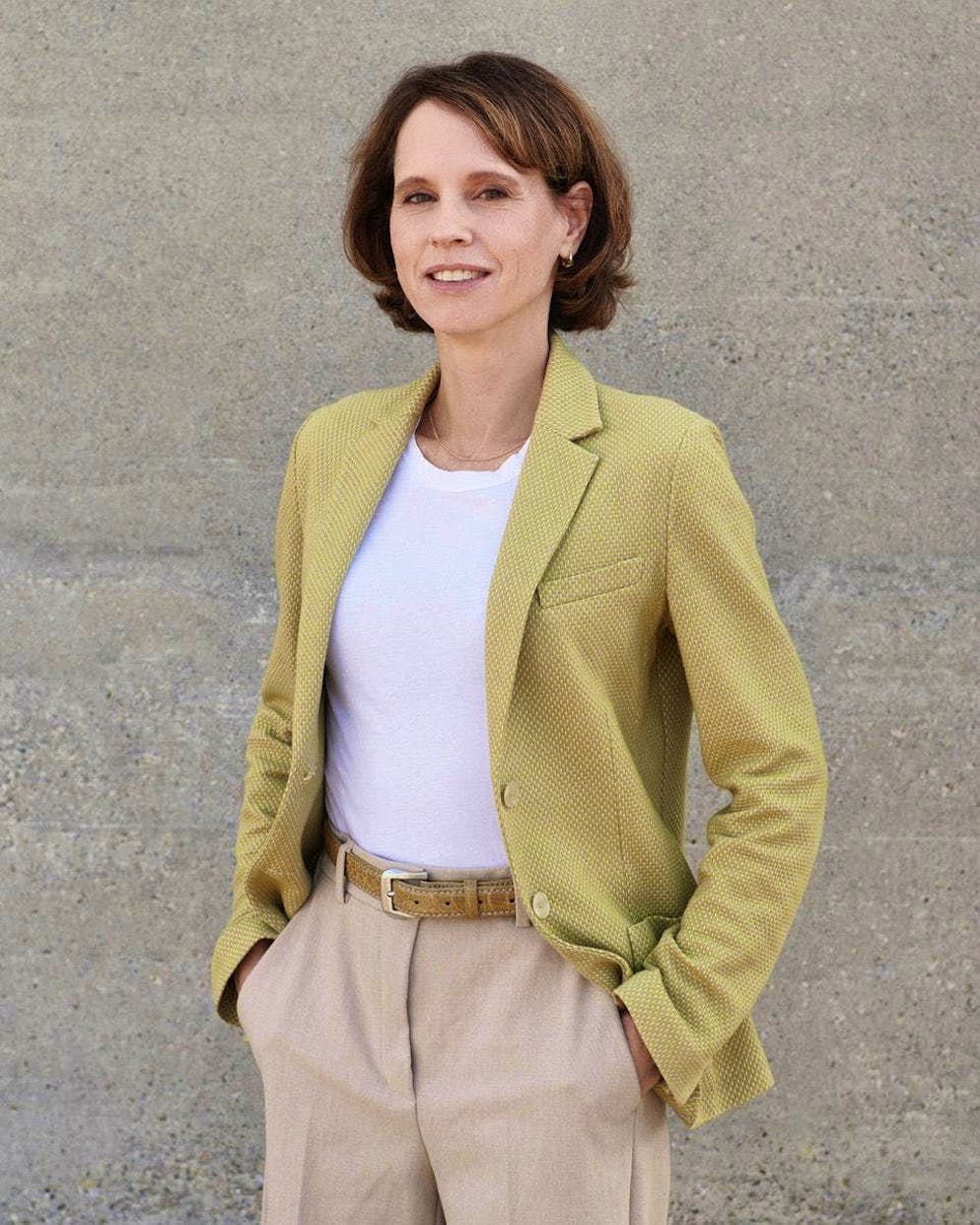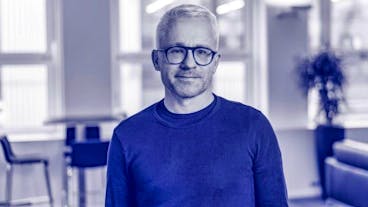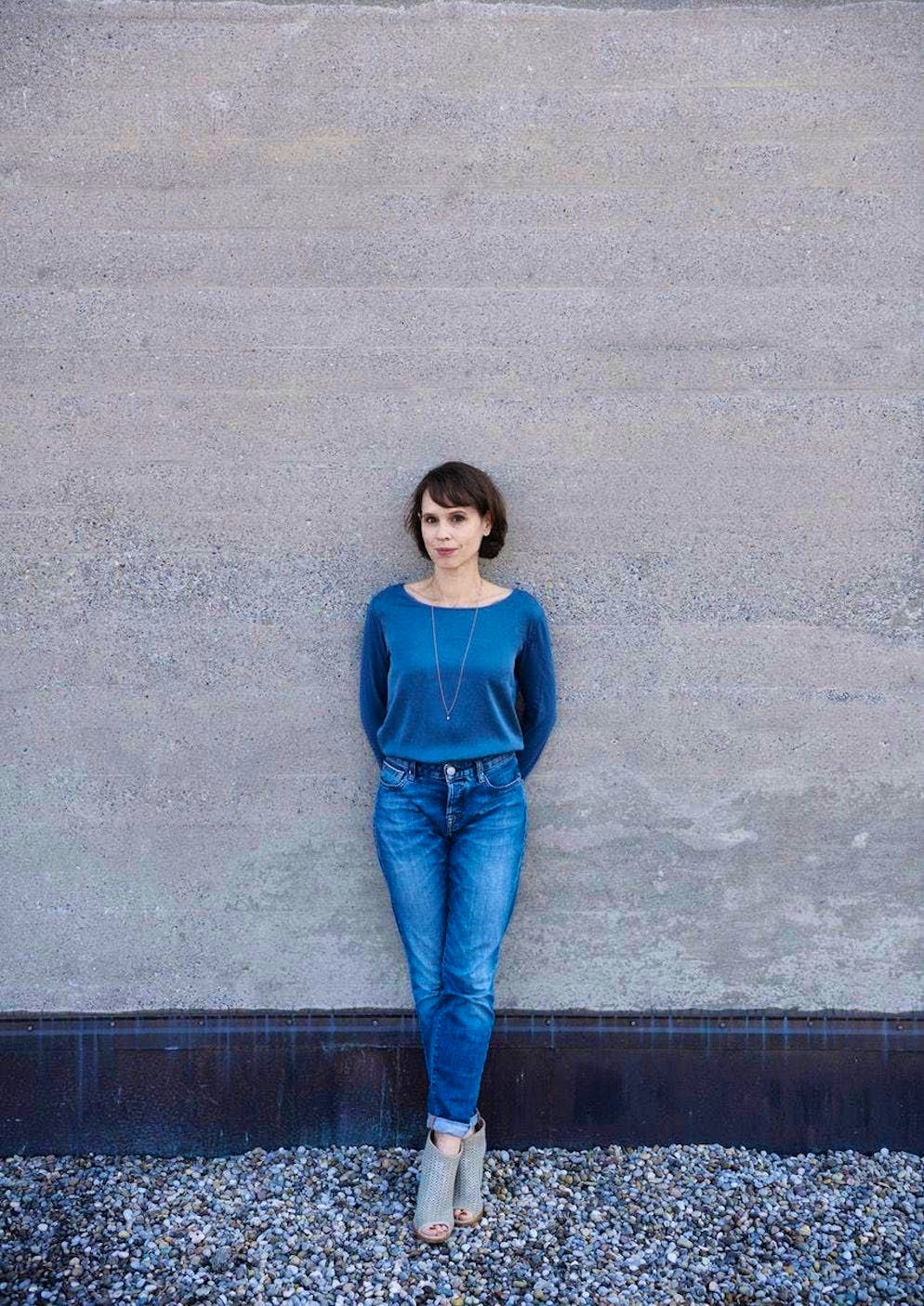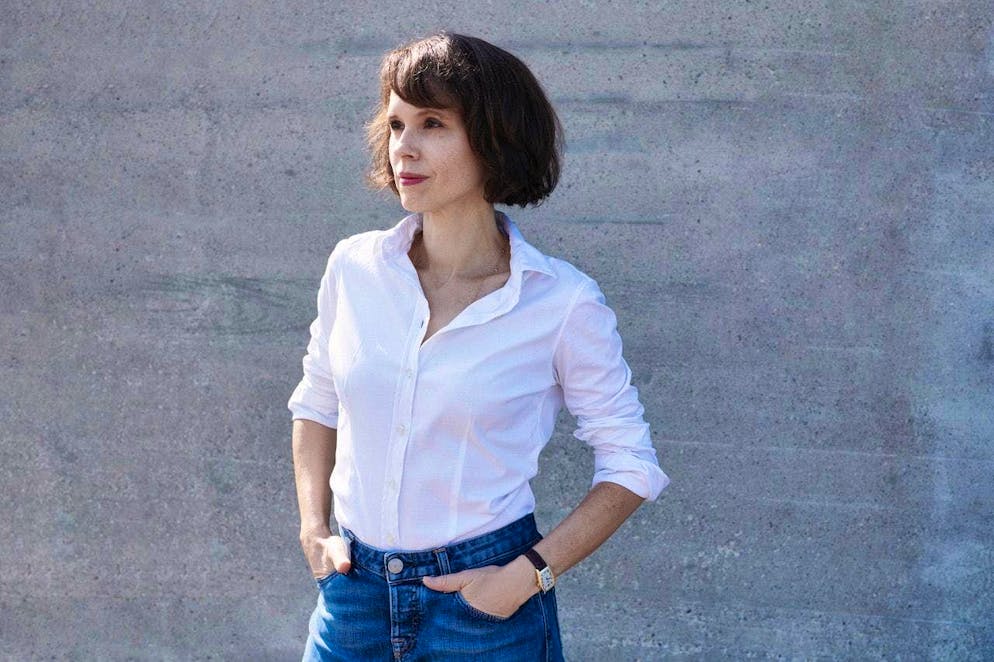Bötschi asks Barbara Bleisch "Only those who are prepared to lose can really love"
Bruno Bötschi
7.9.2024

In her book "Midlife", Barbara Bleisch describes this phase of life as particularly happy. A conversation with the philosopher about getting older - and why crises make people stronger.
No time? blue News summarizes for you
- In her book "Mitte des Lebens - Eine Philosophie der besten Jahre", philosopher Barbara Bleisch (51) describes this phase of life as a time of abundance and happiness.
- In her book, the presenter of the SRF program "Sternstunde Philosophie" explains what is important in the middle years.
- Bleisch's book has triggered a great response and has been at the top of the bestseller lists for weeks.
- "To this day, the narrative of the middle years as a time of crisis prevails. But it can't be that this entire phase of life just feels complicated for everyone," says Bleisch in an interview with blue News.
- She continues: "I'm convinced that many people can't identify with this and are longing for a correction."
Barbara Bleisch, I'm going to ask you as many questions as possible over the next 30 minutes. And please answer as briefly and quickly as possible. If you don't like a question, you can also say "go on" once.
I am curious.
Mountain or valley?
Mountain. I like the view from a summit and the fact that I get an overview on a mountain. It gives you the opportunity to distance yourself from topics that are too close to you.
Summer or winter?
Autumn. I appreciate ambivalence and love nuances. On the other hand, I don't like heat, which makes me unable to think properly, and eternal darkness. I know from experience that cold and retreating into isolation don't do me any good in the long term. What I do like are the spectacles of nature, such as when the sun breaks through the fog.
Hazel Brugger or Patti Basler?
Patti Basler. I love her new program and I like her political humour. I've rarely seen Hazel Brugger live, but I've been following Patti Basler's work for years.
When was the last time getting older felt really good?
(Reflects) Getting older feels a bit good almost every day - especially when I realize that I wonder less about what others think as I get older and that a lot of things have already fallen into place. These are the moments when I realize that life experience is something beautiful - and how well I can use it.
About the author: Bruno Bötschi

blue News editor Bruno Bötschi regularly talks to well-known personalities from Switzerland and abroad for the question-and-answer game "Bötschi fragt". He asks them lots of questions - always direct, often funny and sometimes profound. It always remains open until the very last question as to where the fast-paced ping-pong will lead.
When was the last time you felt ashamed?
When I recently ate my husband's box of chocolates.
You are 51 years old. Are you more or less ashamed today than you used to be?
Less.
What did you think when "Spiegel" culture editor Tobias Becker told you in an interview: "I read your book "Mitte des Lebens" on the train and took the cover off beforehand. I would have been uncomfortable being seen with it by fellow passengers."
To be honest, I found that incredibly funny, because I hadn't thought about it until then. At the same time, it was another reminder that there are people for whom mid-life feels awkward. A fact that is part of the reason why I wrote the book.
Is the "Spiegel" journalist the only person who was embarrassed by reading your book - or have you received other reactions like that?
Not so far. Funnily enough, after the interview with Tobias Becker, we were talking among my friends about which books we would be too embarrassed to read in public. During the discussion, we reminisced about the time when the erotic movie "Fifty Shades of Grey" was showing in cinemas. Back then, women were always seen reading the novel of the same name - but had wrapped it in wrapping paper as a precaution.
Personally, I'm not embarrassed about getting older per se, but that I'm much older than most of my colleagues in the blue News editorial team. I don't want to hear the sentence at some point: " Bötschi always acts so young, he's just embarrassing." Do you feel the same way?
No - at least I don't think I always act young. It might have something to do with the fact that I'm the mother of two teenage daughters. I find nothing more horrible than when parents help themselves to their own children's closets.
But what does it mean to be young? The values and norms that we associate with typical lifestyles today have changed and are fortunately no longer as rigid as they used to be. Age has lost some of its relevance. But what I have also noticed is that I am suddenly in the minority.
What do you mean by that?
The media landscape is changing a lot at the moment. A conspicuous number of people in their middle years are leaving journalism - for whatever reason. And so it can happen that you suddenly belong to the old guard and at some point realize that the intern could be your own child.
There's something ambivalent about that. I don't just see it as a negative thing - especially when a company allows older employees to take on a senior role, i.e. to take responsibility for the next generation. I think that's a good thing.
Were there other reactions to your book that you didn't expect?
(Thinks for a moment) They ask me difficult questions. I didn't expect my book to be so well received. A few days ago, my publisher received the first requests for licenses - from China and Korea.
Your book has been at the top of the bestseller lists for weeks. Why do you think people are so interested in the topic of "midlife"?
The narrative of the middle years as a time of crisis still prevails today. But it can't be that this entire phase of life just feels complicated for everyone. I am convinced that many people cannot identify with it and long for a correction.

Maybe that's why so many people are now happy that a book is finally dealing with the positive aspects of midlife.
Yes, who knows. In any case, it's striking how many people are currently looking at the specific questions they face in the various phases of life. Many books are currently being published about ageing and dying.
And a whole series of young authors are asking themselves how they want to shape their lives and what they should think of the meritocracy that they have been taught by adults. In this respect, it seems to me that it is time for us mid-lifers to think about what constitutes our view of life.
"In philosophy, midlife is an unexplored area in contrast to childhood and youth or old age and death," you recently said in an interview with the NZZ. Could this lack of research be one of the reasons for the interest in the topic?
Philosophically speaking, midlife is a completely neglected phase of life. There are just two English-language publications that make a consistent effort to address this phase of life - otherwise it is a wasteland. The question remains: why do philosophers simply leave out the middle of life?
And have you found an answer?
A malicious answer would be that the whole history of philosophy is nothing more than a tale of middle-aged white men. All right, I said to myself, then I'll just add a narrative by a middle-aged woman. In my opinion, however, it makes a big difference whether I am 25 or 45 when I think about topics such as remorse and regret.
The reason why I immediately read the NZZ interview was the title "Anyone who thinks they're still 30 at 50 is just sorry". I thought you had something against still feeling young in middle age. But then I realized that your statement was very abbreviated.
Isn't that always the case with titles?
I hope not. In the interview you say: "I feel sorry for anyone who thinks they're still 30 at 50 and haven't gained any life experience."
I explicitly deleted the two words "simply" and "only" in the NZZ interview. The statement sounds almost malicious in the title - and that's not what I wanted to say. What I wanted to say was that I don't really understand what we mean when we say: "I feel much younger than I am." We often simply don't want to admit how old we are.
However, some people may also mean that our parents looked much older at 50 than we do today. There is certainly something to that. Today, we allow ourselves to stay young for longer in certain respects. We are no longer restricted to the fact that we can no longer skateboard at 50 and have to wear brown cardigans at 60. And that's a good thing.
What don't you like about the statement "I feel much younger than I am"?
I read more and more often that 60 is the new 30. Or 70 is the new 50. I always ask myself where the years in between have gone. We can't just delete them without losing anything. Because hopefully those were also years in which we not only got older, but also had new experiences and grew from them.
When you talk about life experiences that a person should gain by the age of 50, what do you mean specifically?
There are so many things that are important in life, but we can only learn about them through our own experience - so we don't learn them at school. For example, knowing how much it hurts when I'm grieving for a loved one. Or what heartbreak or homesickness feels like. We have to experience these things first-hand in order to know what it feels like and how to cope with these situations. Such experiences are important for our development so that we can become more confident as we get older - and so that certain experiences, however terrible they may be, don't throw us off course.
That's why life experiences are so precious.
That's how it is. Everyone experiences situations that challenge them and during which they think they cannot survive and will never be truly happy again. With increasing life experience, we learn that this is not the case. This doesn't mean that bad experiences don't leave scars - but they also make us wiser and easier to make decisions later on because we know more precisely what we want and what we don't want. Not least because at some point we realize that porridge is often cooked hotter than it is eaten.
Do people's problems with ageing perhaps also have to do with the fact that we are becoming increasingly aware of the finite nature of life? Or to put it more specifically: are you more afraid of death today?
Yes, of course that has something to do with it. I myself am no longer afraid of death. Although I do find it very threatening how many weeks I have left, given an average life expectancy.
How many are there?
Just over 1500 weeks.
That little?
That's what I thought at first. And yes, you can be overcome by horror at a difficult moment. I think life is great. At the same time, I have also dealt intensively with death in the past.
Why is that?
I lost a very good friend surprisingly early in life. That was difficult for me and gave me a lot to think about. Many people only have their first experience of death in mid-life - in other words, when their grandparents or parents die. I therefore understand that dying and death in the middle of life can have a threatening effect on us, but at the same time it also enables us to get serious about what we want. There just isn't time forever.
Has your relationship with death changed as you've grown older - for example, when you became a mother?
That's a funny question. I would say that giving birth first changes your relationship to life. I give life to a child, and if everything goes well, you don't have to let go of that life so quickly. At the same time, there is also something comforting about giving birth, because you see with your own eyes that life goes on.
This is a topic that the American philosopher Samuel Scheffler has also dealt with. In his book "Death and the Afterlife", he poses the question of how we would react if we knew that the world would end tomorrow. Scheffler believes that our lives would be completely meaningless.

Because if we knew that when we died, the world would disappear without a sound, we would be deprived of all the categorical desires that make up our lives and what we really care about. Why should we do cancer research, for example, when we know that the world will end in five years?
Or why campaign for better traffic management in our own neighborhoods or fight against racism in Switzerland if it will all be over soon? We humans are dependent on things continuing and surviving.
What do you wish you had known when you were 18 that you know today?
If I had known it when I was 18, I wouldn't be who I am today.
When I was 18, I resolved not to get bored in old age and to always go through life with my eyes wide open.
I didn't make any such resolutions.
As a young adult, it annoyed me when people said: "I'm not going to do that anymore, I'm too old for that."
I'm much more annoyed by the imperative in our society of what a person absolutely has to do and experience before they die. I am an advocate of freedom from lead and find it pleasant not to always have to try everything. But that doesn't mean that we should become increasingly slack as we get older.
Rather?
One advantage of middle age is that we are more likely to have the courage to consciously stop doing certain things - along the lines of "I say no to that from now on: No, thank you".
For me personally, turning 40 was much more difficult than turning 50. How did you feel about that?
To be honest, my 30th birthday was even more stressful.
Why was that?
Back then, someone close to me said to me: "Welcome to the club, now you have a three on your back too." That didn't sound particularly friendly and it actually felt a bit like that to me, because at 30 I also had the impression that I still had so much to become, but at the same time I had the feeling that time was running out.
At the time, I thought I finally needed a decent job and would soon have to decide whether I wanted a family. My 30th birthday therefore felt much more difficult. I was happier at 40 and 50 didn't cause me any difficulties. I had a big party back then.
I had a big party on my 49th birthday.
That was also nice.
In Switzerland, midlife is just under 40. At the same time, it is always said that 40 is the low point of the happiness curve. After that, things get better again. What do you think of this statement?
The studies by Blanchflower and Oswald are also older and not uncontroversial. Today, developmental psychologists draw the so-called U-curve of life satisfaction with the trough in the middle years much flatter. Above all, however, social scientists have a different concept of happiness than we philosophers. I always say that anyone who thinks that a happy life consists primarily of full satisfaction is mistaken.
What do you think a good life consists of?
A good life is a life of abundance, but this abundance sometimes also includes being sad, suffering losses and despair. This has to do with the fact that we humans are vulnerable beings, so we can also take risks in life - and in my opinion, we should always do so. Only those who dare and are prepared to lose once in a while, for example, can truly love.
Ms. Bleisch, after you have dealt intensively with the middle of life: Do you have any specific tips for blue News readers between 40 and 50 to help them navigate the U-curve of happiness with some ease - or is reading your new book enough?
Anyone who reads my book will quickly realize that I haven't written a guidebook. That's why I don't have any tips in store. Philosophy can't simply be summarized in a few tips. Rather, I believe that it is helpful to make our helplessness, which we all feel from time to time because life is a serious task, a common cause, just as the thinker Hannah Arendt said.
I also found the corresponding idea in the novel "On all fours" by Miranda July. In it, the main character decides to hold an open source day in the future: To brood together about how we can get through life better. That's what it's all about: let's start a conversation together and think about what experiences are important, what is good for us and what is less so. I firmly believe that this will make life easier for all of us.
My favourite sentence in your book was on page 141, where you quote Bertolt Brecht: "You can recognize good people by the fact that they get better when you recognize them. Good people invite you to improve them, because what makes someone smarter? By listening and by telling them something."
That makes me happy.
Which statements about the middle of life do you particularly like?
I was inspired by all the topics and questions in the book, otherwise I wouldn't have been able to write about them. But the biggest discovery for me was the chapter about the splendor of life.
At the end of your book, you mention the British philosopher Bertrand Russell. In the prologue to his autobiography, published in 1969, he writes that he would like to live his life again - unconditionally. Would you not want to change anything if you were allowed to live your life again?
In the book, I write that I wish I could die like that one day. Not least because I know that Bertrand Russell had anything but an easy life. I also believe that complicated and difficult events in my life had a significant impact on me. At the same time, however, I sometimes think that certain difficulties should not have happened - especially when I think of situations in which I have hurt other people and in retrospect feel sorry for it.
"Mitte des Lebens - Eine Philosophie der besten Jahre", Barbara Bleisch, 272 pages, Hanser Verlag, from 24 Fr.


